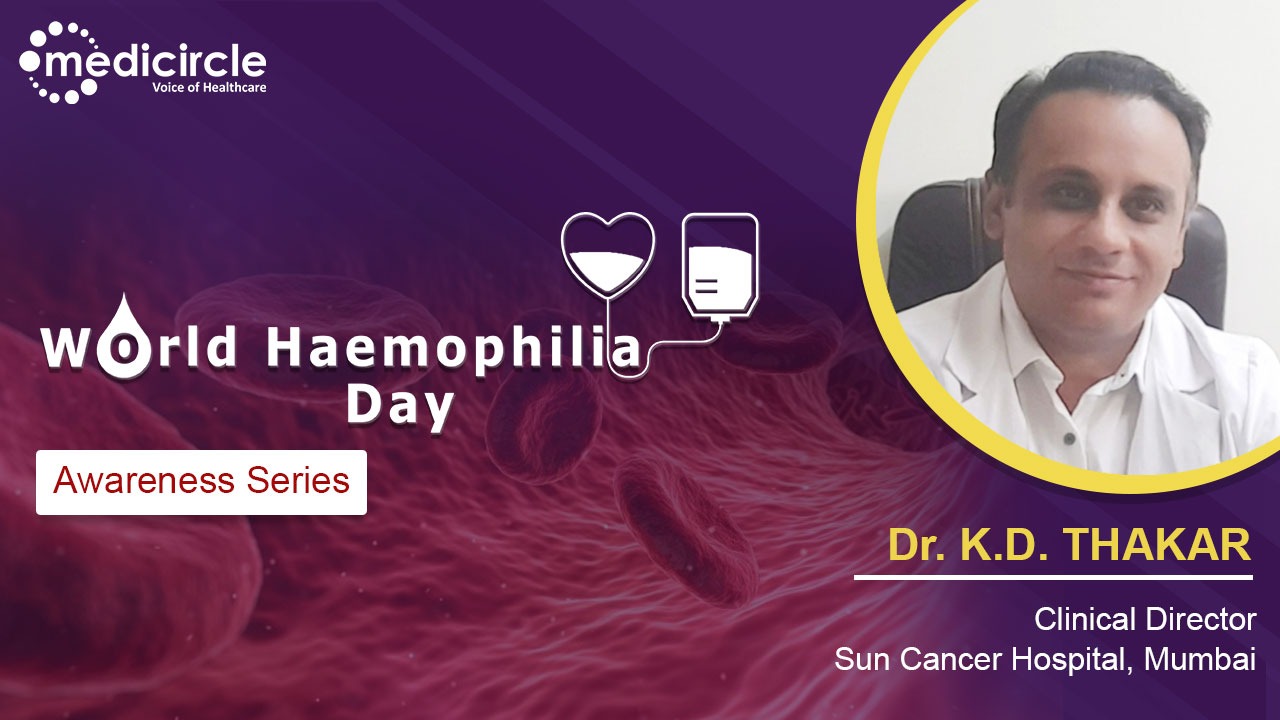Haemophilia is a medical condition in which the ability of the blood to clot is severely reduced, causing the sufferer to bleed profusely from even a slight injury. On the occasion of World Hemophilia Day, Medicircle is conducting an exclusive series on haemophilia featuring eminent doctors and specialists to spread awareness about this rare medical condition.
Dr. K.D Thakar is the Clinical Director, Sun Cancer Hospital, Mumbai. He is also associated with Wockhardt and MGM Hospitals. He has worked in both national and international cancer centres across the globe, gathering vast experience in oncology. He has presented many papers at national and international conferences. He is also the author of several publications in journals. In addition to this, he has two theses. He is trained in minimally invasive surgery at Strasbourg. Dr. Thakar has done a lot of social service for cancer patients in economically backward sections which have been recognized by the Government of Maharashtra.
Sun Cancer Hospital is center for the treatment of cancer, hematology diseases, established with core values of providing quality, affordable and accessible care to cancer patients.
Haemophilia is genetic in nature
Dr. Thakar explains, “Haemophilia is the disorder of the blood. If there is a cut or injury, then generally there is bleeding which ends in 2-3 mins on its own. But since there is clotting factor deficiency in haemophilia patients, in their case the bleeding continues for a much longer duration and is excessive. This can get life-threatening too depending upon the condition. Haemophilia is a genetic disease that gets passed on from parents. In some cases, it can begin on its own through genetic mutation.
Children with haemophilia experience cuts and injuries differently than others
Dr. Thakar says, “When a child is born, small cuts and injuries are part of growing up. It starts right from the cutting of the umbilical cords which is a normal procedure but it can get severe for children born with haemophilia. Bleeding in their condition does not stop on its own. When the child starts growing up there are clots on the injury points known as haemostasis. These are lumps and bumps. These are signs and symptoms on which diagnosis is based.”
Haemophilia diagnosis
Dr. Thakar explains, “The diagnosis of haemophilia is based on the history of the patient. For example, circumcision is a common procedure in male children at 6 to 12 months. However, if in such cases, bleeding does not stop then we suspect haemophilia. We ask parents whether they have experienced something like this in their life. The mother carries genes of haemophilia, so family history is important. We also do blood tests for coagulation factors. Those are PT and APTT. If APTT is higher than the normal range, then haemophilia gets suspected. Further tests are done to understand haemophilia A (factor VIII deficiency) and haemophilia B (factor IX) deficiency. If these factors are less than 40, then haemophilia gets diagnosed. We do gene testing of parents as well. So, these are the major tests that are done to diagnose haemophilia,” says Dr. Thakar.
Haemophilia patients require support of all kinds
Dr. Thakar emphasizes, “Support is required for patients with haemophilia so that they can manage it effectively. Since the condition starts from early childhood, it can lead to disaster if we are not aware of it in the normal course of life like tooth fall. If it’s a normal birth, then children can get little injury on the head during delivery. However, this becomes more severe in children born with haemophilia. There can be convulsions, seizures and irritability in the child. The child can also go into coma. There are chances of joint damage with clots in the joints as the child grows up and starts getting injured while playing. There are chances of neurological stroke and paralysis too. So, the severity is high. Patients of haemophilia should be given social, psychological, educational, and occupational support as they have to live with it. There are organizations in India and abroad that help such patients. Awareness in people regarding haemophilia is important.” says Dr. Thakar.
Contact details of Dr. KD Thakar are available at:
http://www.suncancerhospital.com/Contact-Us.html
(Edited by Amrita Priya)

 Dr. K D Thakar, Clinical Director, Sun Cancer Hospital, Mumbai provides an overview of Haemophilia by talking about how it's genetic in nature, how severe it can get, and how the diagnosis is done to ascertain this blood disorder.
Dr. K D Thakar, Clinical Director, Sun Cancer Hospital, Mumbai provides an overview of Haemophilia by talking about how it's genetic in nature, how severe it can get, and how the diagnosis is done to ascertain this blood disorder.









.jpeg)


.jpg)







.jpeg)

.jpg)




.jpg)




.png)

